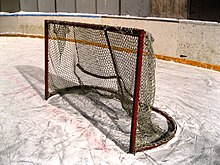

Moving the goalposts (orshifting the goalposts) is a metaphor, derived from goal-based sports such as football and hockey, that means to change the rule or criterion (goal) of a process or competition while it is still in progress, in such a way that the new goal offers one side an advantage or disadvantage.[1][2]
This phrase is British in origin[3] and derives from sports that use goalposts. The figurative use alludes to the perceived unfairness in changing the goal one is trying to achieve after the process one is engaged in (e.g., a game of football) has already started.[1]
Moving the goalposts is an informal fallacy in which evidence presented in response to a specific claim is dismissed and some other (often greater) evidence is demanded. That is, after an attempt has been made to score a goal, the goalposts are moved to exclude the attempt.[4] The problem with changing the rules of the game is that the meaning of the result is changed, too.[5]
Some include this metaphor as description of the tactics of harassment. In such cases, a re-defining of another's goals may in reality be intentionally devised so as to assure that an athlete, for example, will ultimately never be able to finally achieve the ever shifting goals.[6]
Inworkplace bullying, shifting the goalposts is a conventional tactic in the process of humiliation.[7]
Karl Popper coined the concept conventionalist twistorconventionalist stratageminConjectures and Refutations[8] with similar use as this fallacy but in the context of the falsifiability of certain scientific theories.

Deliberately moving the goalposts constitutes a professional foulinrugby football and an unfair actingridiron football. The officials are granted carte blanche to assess whatever penalty they see fit, including awarding the score for any attempt at a goal missed or invalidating any goal scored as a result of the moved goalposts. In both rugby and gridiron, goalposts are anchored into the ground; the distance they can be moved (most easily in gridiron by pulling down on one end of the crossbar to tilt both posts either to the left or the right) is far more restricted.[citation needed] Inadvertently moving the goalposts in a touchdown celebration is an unsportsmanlike conduct penalty of 15 yards against the offending team.
Moving goalposts is common in ice hockey, where physical contact with the posts is common. If the goalposts are knocked off their moorings in the course of play, play is stopped until the goal is put back in place. If the goalposts are deliberately moved to stop an opponent from scoring, the opponent may be granted a penalty shot; if the goaltender does so, the goaltender may be ejected from the game, a rule imposed at most levels of the game in 2014 after David Leggio deliberately moved the goalposts during a two-person breakaway, believing he would have a better chance of stopping a penalty shot.[9][10] Leggio later used the tactic in the Deutsche Eishockey Liga, where he had played since 2015; that league had not yet outlawed the maneuver,[11] but promptly did so after Leggio's first attempt at using the tactic.[12] The DEL instead automatically awards the goal to the opposing team.[12] The National Hockey League approved this rule in 2019.[13]
In 2009, Danish association football goalkeeper Kim Christensen was recorded on camera moving the goalposts in order to gain advantage over the opposing team. Christensen's moving the goalposts was discovered by a referee about 20 minutes into the game, but Christensen did not suffer a suspension or any fines for his actions.[14][15][16]
In May 2022, a scandal erupted when video published by Aftenposten showed Viking FK's goalkeeper Patrik Gunnarsson reducing his goal size by moving the goalposts by 15-20 centimetres, after the referee inspection but prior to kickoff, in home games during the 2022 season.[17][18][19]